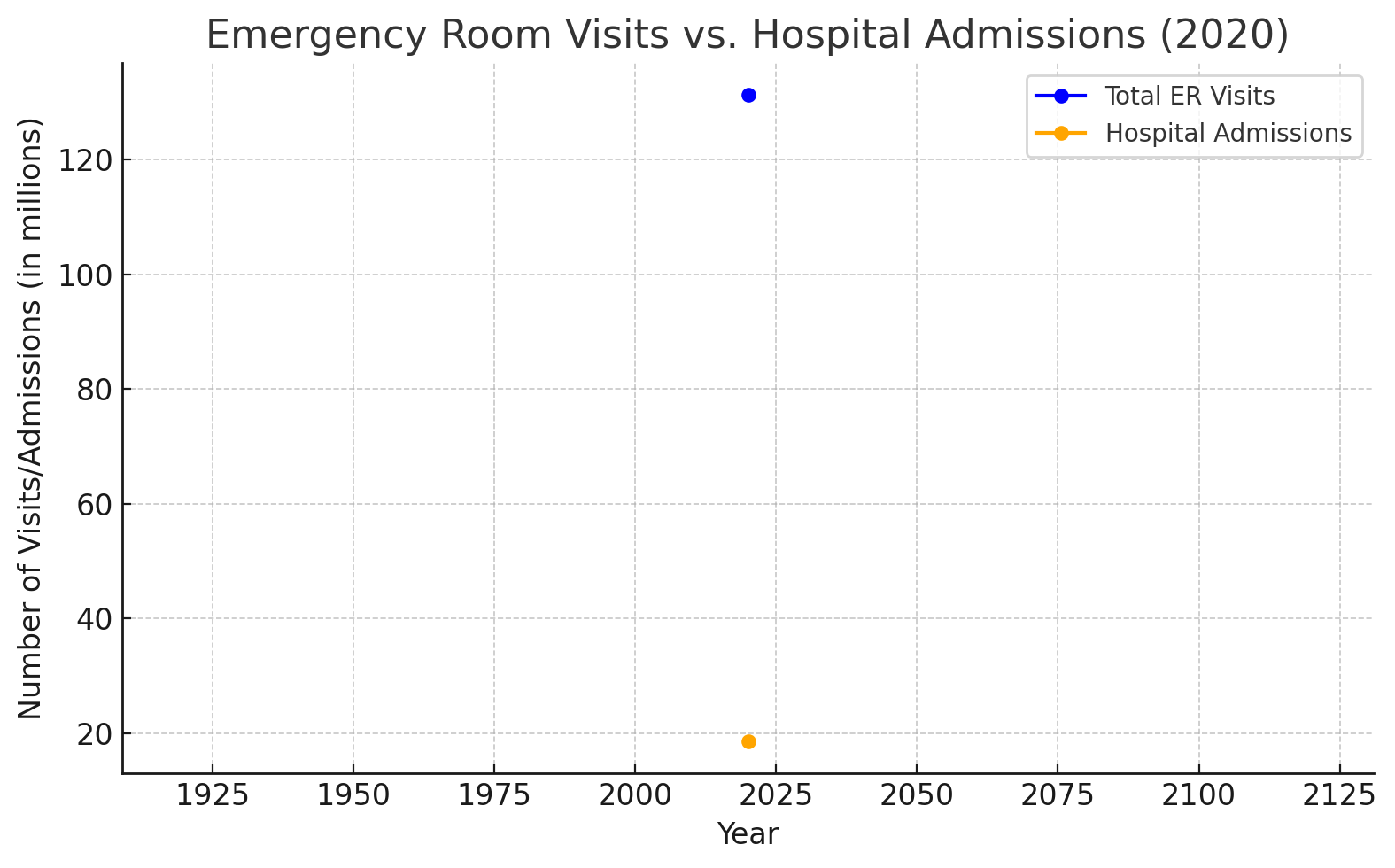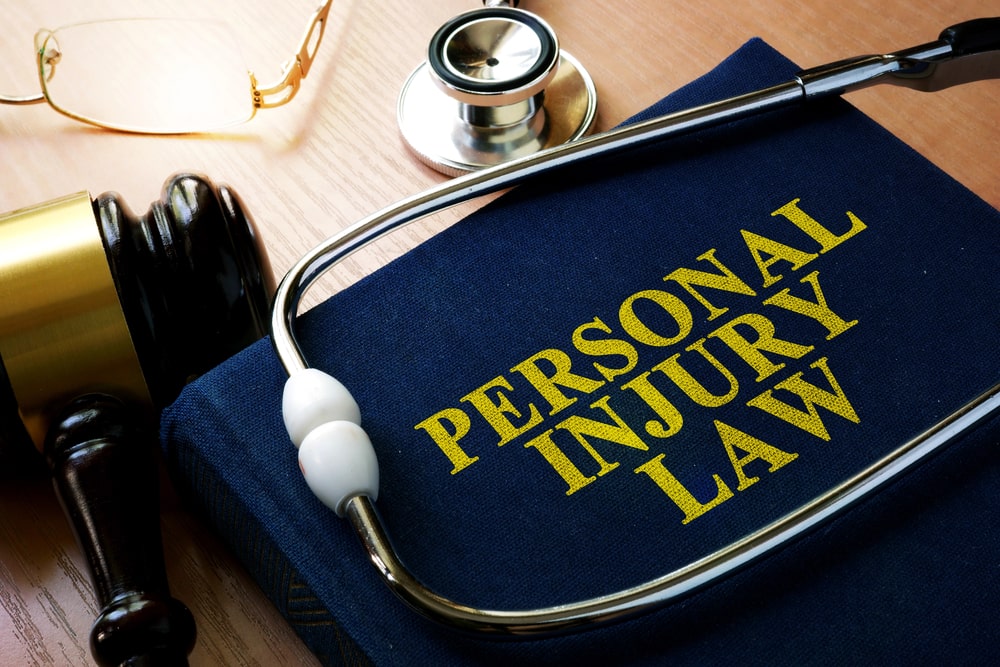Arlington Personal Injury Lawyer
A personal injury lawyer in Arlington, VA victims trust from The Law Offices of Ryan Quinn, PLLC knows that injuries happen every day, often when you least expect them. An unavoidable accident causes some, and others occur because of another person’s negligent action or inaction. Moderate to severe injuries might leave you with several pressing questions. For example, how will you pay your medical bills? Who is at fault? Or, do you have a claim?
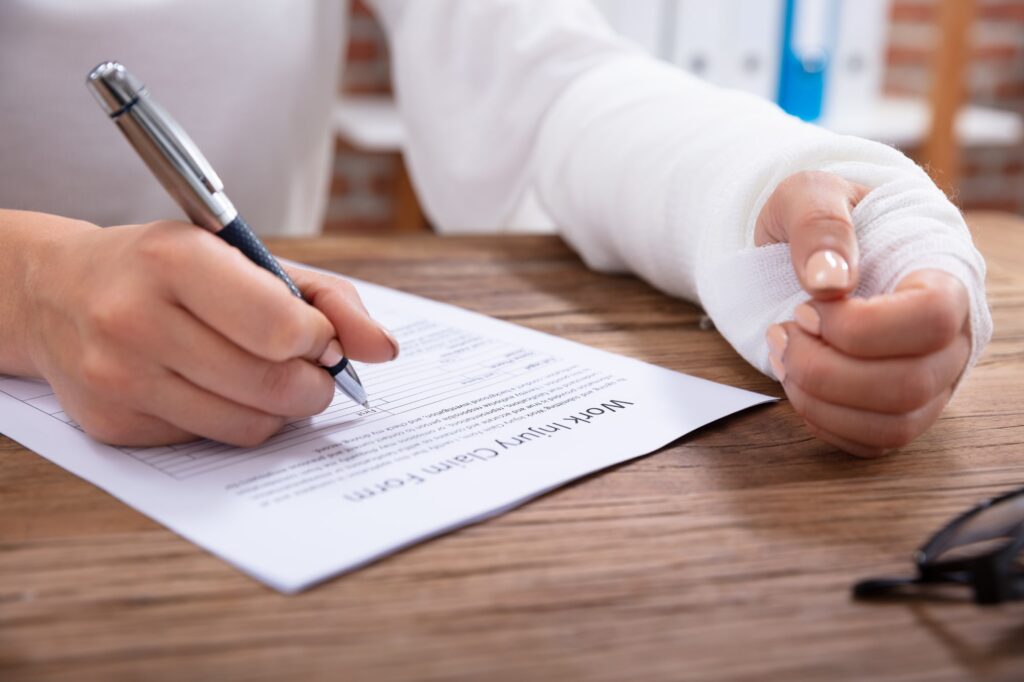
Table Of Contents
- What Are Personal Injuries?
- What Types Of Compensation Can You Receive In A Personal Injury Case?
- Building A Strong Case
- What Happens If Your Personal Injury Case Was Denied?
- Steps To Take After A Denial
- Reasons To Avoid Posting To Social Media
- Reasons To Avoid Posting To Social Media Infographic
- How Can A Personal Injury Lawyer Help You?
- Arlington Personal Injury Statistics
- Your Frequently Asked Personal Injury Questions
- Ryan Quinn Arlington Personal Injury Lawyer
What are Personal Injuries?
Personal injuries encompass a wide range of physical and emotional harm that individuals may suffer due to the negligence or wrongful actions of others. These injuries can occur in various settings and circumstances, and personal injury law is designed to provide recourse for victims to seek compensation for their damages. Here, we will delve into more detail about the common types of personal injury cases mentioned:
Vehicular Negligence:
This category includes accidents involving cars, trucks, motorcycles, and other motor vehicles. It covers situations where a driver fails to exercise reasonable care, such as distracted driving, speeding, driving under the influence, or reckless driving. Victims of such accidents may file personal injury claims against the at-fault driver.
Bike Accidents:
Cyclists can be vulnerable on the road and may be involved in accidents caused by negligent motorists or poorly designed bike lanes. These accidents can result in serious injuries, and victims may seek compensation from the responsible parties.
Workplace Accidents:
While many workplace injuries are covered by workers’ compensation, some cases may warrant personal injury claims. Examples include accidents caused by employer negligence, failure to provide adequate training, or defective equipment.
Medical Malpractice:
When healthcare professionals, such as doctors or nurses, make mistakes in diagnosis, treatment, or surgery, and a patient suffers harm as a result, they may be liable for medical malpractice. Examples of medical malpractice include misdiagnosis, surgical errors, and prescription errors.
Nursing Home Abuse:
Elderly residents in nursing homes can be subjected to neglect, abuse, or substandard care. Family members of victims can pursue personal injury claims against the facility or staff responsible for such mistreatment.
Premises Liability:
Property owners have a duty to maintain safe premises for visitors. Injuries resulting from slip and fall accidents, trip and fall accidents, inadequate security, or dangerous conditions on someone else’s property may lead to premises liability claims.
Product Liability:
When a defective or dangerous product causes injury, victims can file product liability claims against the manufacturer, distributor, or seller of the product. This category often involves complex litigation and may include large corporations as defendants.
Wrongful Death:
In cases where a person’s death is the direct result of someone else’s negligence or wrongful actions, surviving family members may bring a wrongful death claim. These claims seek compensation for the losses suffered due to the untimely death of a loved one.
Government Injuries:
Injuries caused by the negligence of government entities or municipalities fall into this category. These cases are subject to specific regulations, time limits, and procedures that differ from typical personal injury cases. Seeking compensation from the government can be challenging and often requires legal representation.
It’s important to note that personal injury cases can vary in complexity, and the legal process can be intricate. The Law Offices of Ryan Quinn, PLLC., can help you understand your rights, evaluate the strength of your case, and pursue appropriate legal action. A skilled attorney can guide you through the legal process, negotiate with insurance companies, and advocate for your rights to secure the compensation you deserve for your injuries and damages.
What Types of Compensation Can You Receive in a Personal Injury Case?
If you’ve been injured due to someone else’s negligence, you may be entitled to compensation for your losses. Personal injury cases can result in various forms of compensation to help you recover and rebuild your life after an accident. In this article, we’ll explore the different types of compensation you can receive in a personal injury case. If you’re in Arlington, VA, and need legal guidance, consider reaching out to a dedicated personal injury lawyer at The Law Offices of Ryan Quinn, PLLC for expert assistance.
Economic Damages
Medical Expenses
One of the primary types of compensation in personal injury cases is reimbursement for your medical bills. This includes:
- Hospital bills
- Doctor’s visits
- Medications
- Surgery costs
- Rehabilitation expenses
- Assistive devices (e.g., wheelchairs, crutches)
- Future medical expenses related to your injury
Lost Income
If your injury has caused you to miss work, you may be entitled to compensation for lost wages. This can cover:
- Past and future income lost due to time off work
- Diminished earning capacity if your injury affects your ability to work in the future
Property Damage
In cases involving motor vehicle accidents, compensation for property damage is common. This covers the cost of repairing or replacing your damaged vehicle or other property.
Non-Economic Damages
Pain and Suffering
Personal injury cases often include compensation for pain and suffering, which can be challenging to quantify. This category addresses the physical and emotional distress caused by the injury, including:
- Physical pain
- Emotional anguish
- Mental distress
- Loss of enjoyment of life
- Anxiety and depression stemming from the accident
Emotional Distress
In some cases, victims may experience severe emotional distress, such as post-traumatic stress disorder (PTSD). Compensation may be awarded to address these psychological issues.
Loss of Consortium
If the injury has significantly impacted your relationship with your spouse or family members, you may receive compensation for the loss of consortium. This encompasses the loss of companionship, intimacy, and support.
Punitive Damages
Punitive damages are less common and are typically awarded when the at-fault party’s actions were exceptionally reckless or malicious. The purpose of punitive damages is to punish the wrongdoer and deter similar behavior in the future.
Wrongful Death Damages
In wrongful death cases, compensation is awarded to the surviving family members of a deceased victim. These damages may include:
- Funeral and burial expenses
- Loss of financial support
- Loss of companionship and consortium
- Pain and suffering experienced by the deceased before death
Building a Strong Case
A skilled attorney will help you gather evidence to support your claim, including medical records, accident reports, witness statements, and expert testimonies. They’ll assess the full extent of your damages, both economic and non-economic, to determine the appropriate compensation.
Negotiating with Insurance Companies
Insurance companies may offer settlements that fall short of covering your losses. Your attorney will negotiate on your behalf to reach a fair settlement or, if necessary, take your case to court.
Protecting Your Rights
Insurance adjusters may pressure you to accept a quick settlement, but it’s essential to remember that their primary goal is to save their company money. Your lawyer will protect your rights, ensuring that you don’t settle for less than you deserve.
What Happens If Your Personal Injury Case Was Denied?
Facing a denial of your personal injury case can be disheartening and frustrating. However, it’s essential to understand that a denial does not necessarily mean the end of your pursuit for compensation. In this article, we’ll explore what you can do if your personal injury case has been denied and how The Law Offices of Ryan Quinn, PLLC, a trusted personal injury lawyer in Arlington, VA, can help you navigate this challenging situation.
Reasons for Case Denial
Before diving into the steps to take after a case denial, it’s crucial to understand why your case may have been denied in the first place. Some common reasons for case denial include:
- Insufficient Evidence: If your case lacked substantial evidence to prove liability or damages, the insurance company or the court may deny it.
- Statute of Limitations: Failing to file your personal injury claim within the statutory time limit can lead to a denial.
- Disputed Liability: When there is a dispute over who was at fault for the accident, your case may be denied or delayed until liability is established.
- Failure to Mitigate Damages: If it’s believed that you did not take reasonable steps to minimize your damages after the accident, your case may be denied or result in reduced compensation.
Steps to Take After a Denial
1. Consult with a Personal Injury Lawyer
The first and most crucial step after a case denial is to consult with a knowledgeable personal injury lawyer. At The Law Offices of Ryan Quinn, PLLC, our experienced attorneys can review your case and provide expert guidance on your next steps.
2. Understand the Denial Letter
Your attorney will thoroughly examine the denial letter to understand the specific reasons for the denial. This will help in formulating a strategic response.
3. Gather Additional Evidence
If your case was denied due to insufficient evidence, your lawyer will work with you to gather additional evidence, such as witness statements, expert testimonies, or medical records, to strengthen your claim.
4. Address Legal Errors
If the denial was based on legal errors or missed deadlines, your attorney will address these issues promptly. They may file an appeal or seek to rectify any mistakes that led to the denial.
5. Reevaluate Settlement Options
Your lawyer will reevaluate the possibility of negotiating a settlement with the opposing party or their insurance company. Sometimes, a denial can prompt a more reasonable settlement offer.
6. File a Lawsuit
If negotiations fail to yield a fair resolution, your attorney may recommend filing a lawsuit to pursue your case through the court system. This can lead to a formal legal process, including discovery, depositions, and potentially a trial.
If your personal injury case has been denied, don’t lose hope. Contact The Law Offices of Ryan Quinn, PLLC, and let us assess your case. With my experience in personal injury lawyers in Arlington, VA, I am here to guide you through the appeals process, negotiate on your behalf, or pursue litigation if necessary. Your journey to obtain the compensation you deserve doesn’t end with a denial; it’s just the beginning of a new legal strategy. Reach out today, and let’s work together to pursue justice and fair compensation for your injuries and losses.
Carefully Read the Denial Letter
First, read the denial letter very carefully. It should state the reason(s) why your claim was denied. Common reasons include the following:
- You missed your state’s deadline for notifying your employer of your injury.
- You or your employer missed your state’s deadline for filing the claim.
- You failed to receive sufficient medical treatment for your injury or illness.
- You failed to present sufficient evidence that your injury or illness was work-related.
- Your employer disputes your claim.
- Your injury or illness is not compensable under your state’s workers’ compensation rules and guidelines.
Talk With Your Employer
Tamp down your anger and frustration and meet calmly with your employer or its work comp insurance carrier to determine if the reason for denial is a simple misunderstanding, a clerical error or some other easily resolved problem. If so, your claim can be refiled.
Appeal the Denial
Every state provides for an appeals process on denied work comp claims. Usually, this includes a hearing before an administrative law judge employed by your state’s work comp board or labor department. This is where you will present further evidence, such as additional medical evaluations or treatments, supporting your claim. The best evidence is that which specifically addresses the issue(s) that resulted in your denial.
Make sure you understand how long you have to file an appeal after you receive the denial letter. Do not miss this deadline for any reason whatsoever, or you may be precluded from proceeding with the appeal.
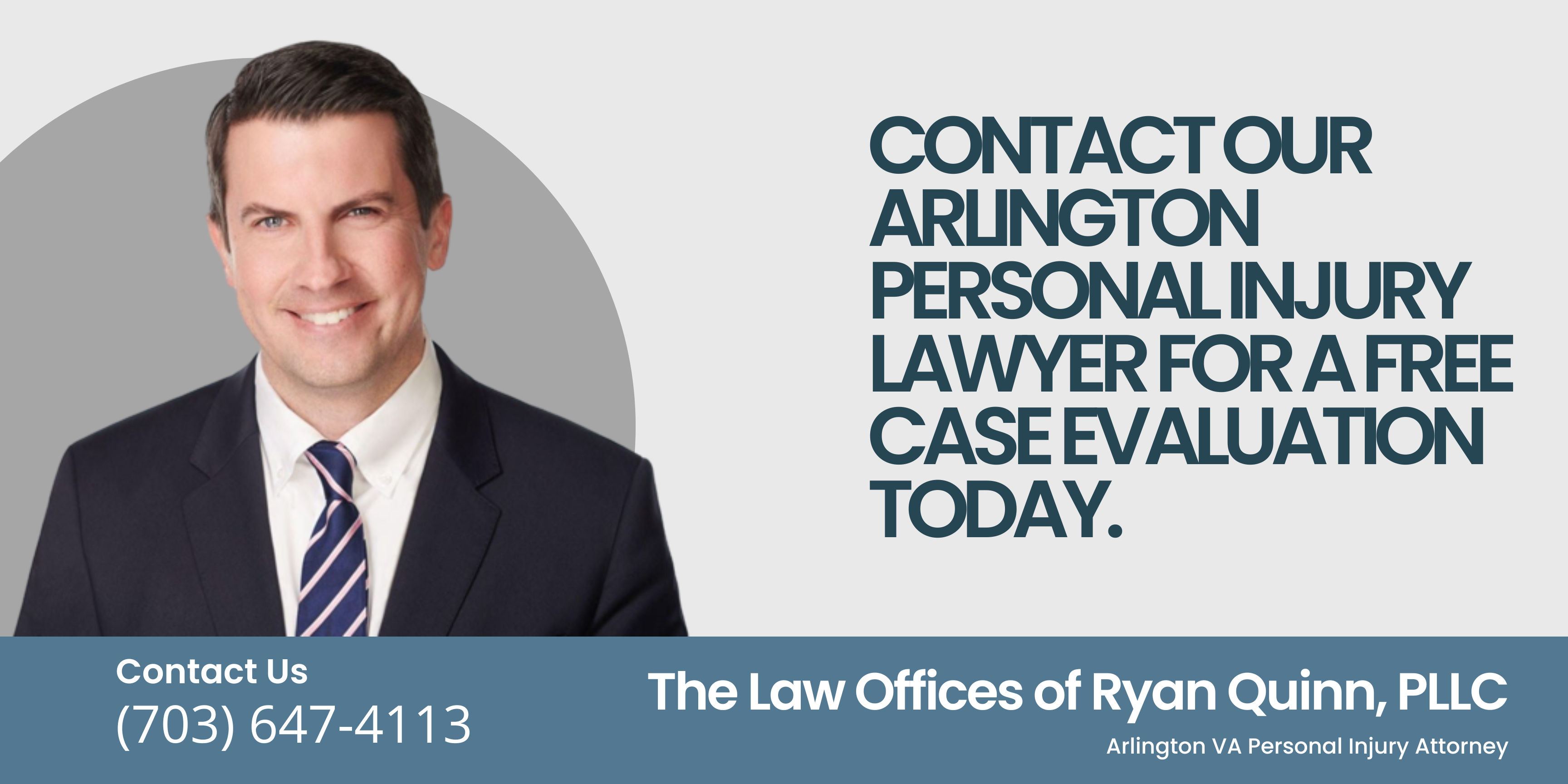 Reasons to Avoid Posting to Social Media
Reasons to Avoid Posting to Social Media
Our personal injury lawyers recommend that following an injury; there are many missteps victims take that can be incredibly impactful to the outcome of their case. While this may seem innocent enough, sometimes, these actions can have a profound impact. If you have been injured, you won’t want to find yourself regretting things you did or said following an accident.
Contacting The Law Offices of Ryan Quinn, PLLC, may be a critical component to receiving skilled and experienced representation and ensuring that victims take the right steps from the very start of their case. Among the top mistakes, a victim can make is posting information about the accident on social media. While social media has many benefits, there is no place for it in your personal injury claim. By doing so, your case could be deeply impacted.
Posting to Social Media
Social media is a common way for people to remain connected to those near and far. As a society, the vast majority of people access social media platforms in one way or another. When an accident victim posts about their accident on social media, anything you share could be used against you. While posting a photo of your injury of the motor vehicle crash may seem harmless enough, be aware that it may not work in your favor. Our team of personal injury lawyers share important reasons not to post on social media sites about your accident:
Social Media is Admissible Against You
Typically anything said outside of the courtroom can be classified as inadmissible because it’s considered hearsay. Because the personal injury claim is about you, any statements made or content about your case posted on social media may be used against you in court. You can’t always control the conversation on social media, and no matter how much control you think you have, it can quickly begin to work against you in your case. If you post a picture of a car accident you were in, people will naturally post comments. Should you or a family member respond with additional information, it can be presented in court.
For example, responding to someone by telling them you are uninjured or that everyone is okay may be misconstrued. The opposing counsel may use this information to prove that you were not as injured as you are presenting to the court.
Social Media Can Bring Your Claim into Question
Social media can add a layer of complications to your legal claim. Many may not realize that even an innocent post about something completely separate can cause problems. For example, if you post content of yourself running a 5k, skiing, or participating in some other form of physical activity, it may contradict the damages you are entitled to. This can lead the opposing side to question the validity of your claim.
Privacy Settings Don’t Always Matter
While you may believe that privacy settings can protect you, social media privacy settings don’t matter when managing a personal injury case. The harsh reality is that once something is posted to social media, it is out there forever. The opposing counsel can attempt to obtain information from people who have access to your account or through the discovery process. Even if your account is private, the defendant’s attorney can request social media records.
Reasons to Avoid Posting to Social Media Infographic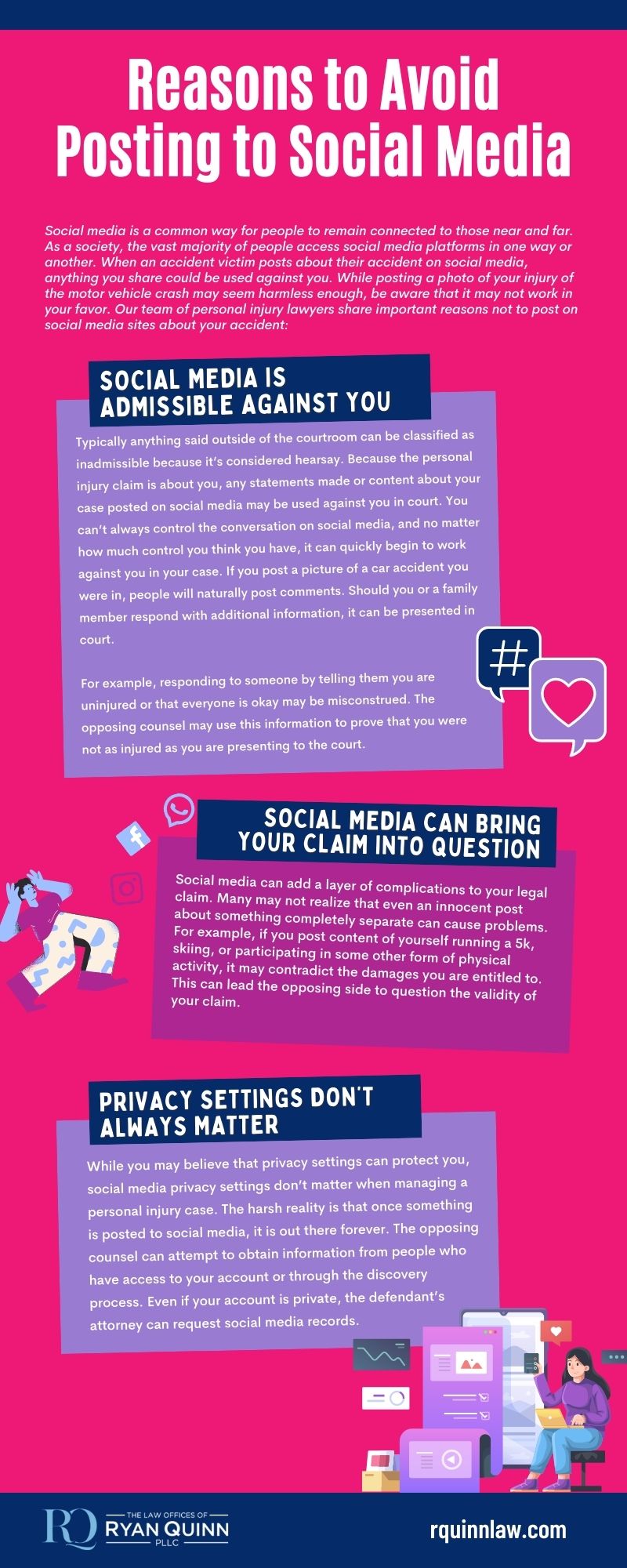
How Can a Personal Injury Lawyer Help You?
A personal injury lawyer is a type of civil litigator who provides legal representation to plaintiffs who believe that they have experienced a physical or psychological injury as a result of the negligence or careless acts of another person, entity, or organization. A personal injury lawyer assists plaintiffs in receiving some type of compensation for their losses. Those losses can include:
- The diminishing of your earning capacity because of the inability to work because of your injury
- Pain and suffering
- Financial loss because of medical expenses
- Emotional distress
- Loss of consortium or companionship
- Legal costs and attorney fees
A personal injury lawyer can also assist with preventing their client from being victimized by insurance companies and the legal system. A personal injury can occur from a variety of circumstances and situations that are out of your control and you should not have to pay for the physical and emotional losses that you have endured because of that injury.
The job of a personal injury lawyer includes drafting pleadings, motions, and discovery requests, and interviewing and deposing witnesses. A personal injury claim can be time-consuming and tedious but having the opportunity to work with a legal professional who has experience in personal injury will be extremely helpful to you and your case. A personal injury lawyer advocates for their clients before and during the trial. This includes counseling clients as well as dealing with any obstacles in the legal system or by their client’s adversaries.
To better understand what your legal options are and how a personal injury lawyer from The Law Office of Ryan Quinn, PLLC could assist you with your claim, call us as soon as possible. We can give you a better understanding of what you might be owed and the steps that the law firm will take to ensure that you get compensation from the negligent individuals involved.
Arlington Personal Injury Statistics
According to the CDC, there were 131.3 million emergency room visits in 2020. 14.2% of these visits resulted in being admitted to the hospital for additional care. Working with a personal injury lawyer from our law firm can be extremely beneficial to you. We can spend the time and energy on your case, something that you might not have the opportunity to do. We also have valuable resources and tools at our disposal to ensure that your case is fully investigated. Our personal injury lawyers will gather evidence, formulate legal theories, and research case law. We can work for you to ensure that you get the best possible outcome and regain what you are owed for your injury.
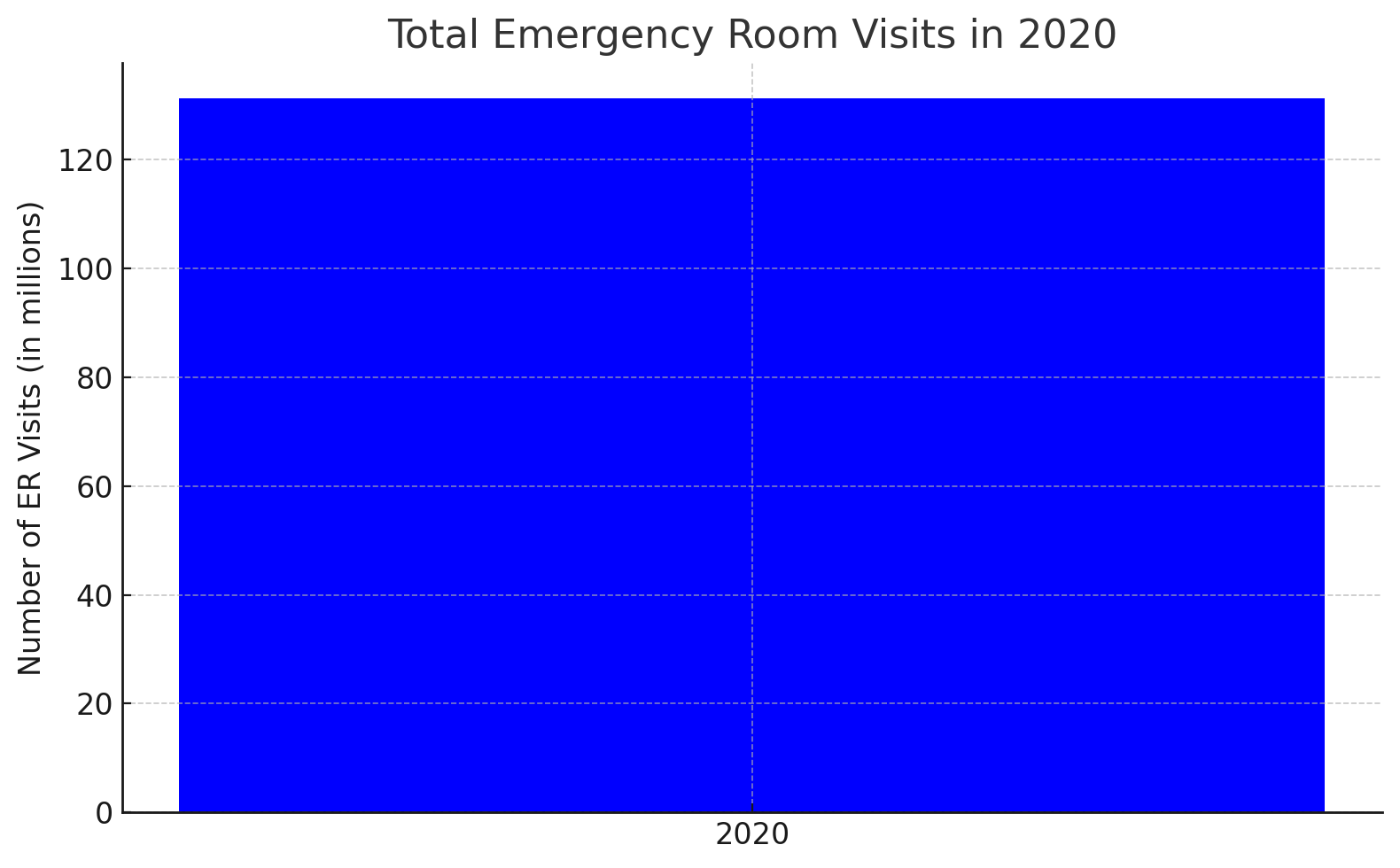
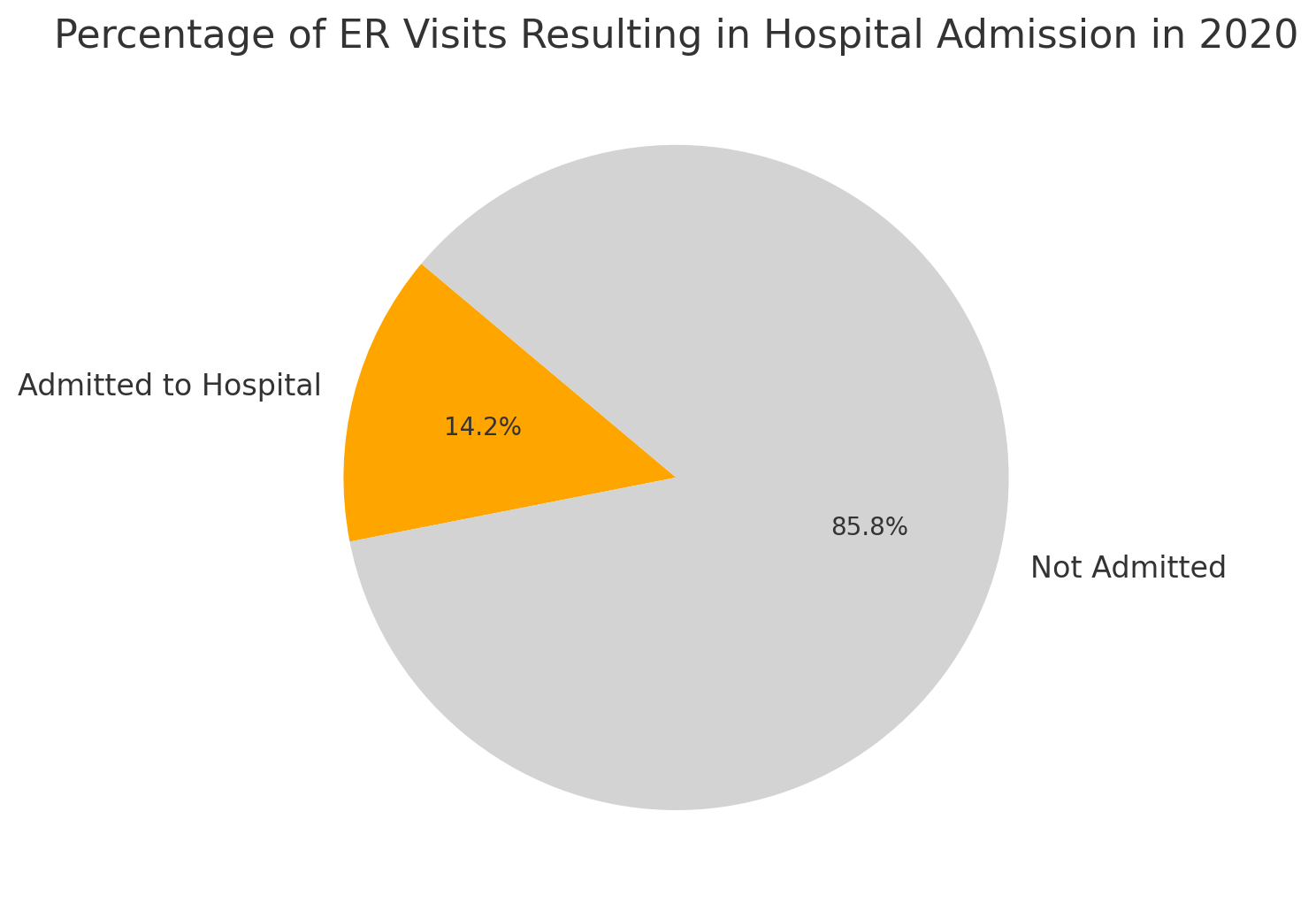
Your Frequently Asked Personal Injury Questions
When it comes to personal injury cases, clients often have many questions. Here are some common inquiries we encounter at the Law Offices of Ryan Quinn, PLLC:
What types of cases does a personal injury lawyer handle?
As Arlington, VA personal injury lawyers, we handle a wide range of cases including car accidents, medical malpractice, slip and falls, workplace injuries, and more. Our role is to assist those who have suffered harm due to someone else’s negligence or intentional actions.
How do I know if I have a valid personal injury case?
To have a valid case, you must prove that another party’s negligence caused your injury. This includes showing that they had a duty of care, breached that duty, and as a result, you suffered damages. An experienced Arlington, VA personal injury lawyer can evaluate your situation and advise you on the viability of your case.
What kind of compensation can I expect from a personal injury case?
Compensation can include medical expenses, lost wages, pain and suffering, and more. Each case is unique, so it’s important to discuss your specific situation with a personal injury lawyer to understand what compensation you might be entitled to.
How long do I have to file a personal injury lawsuit?
Each state has its own statute of limitations for filing a personal injury lawsuit. In Virginia, you generally have two years from the date of the injury to file a claim. It’s crucial to consult with a personal injury lawyer as soon as possible to ensure your claim is filed on time.
How does the legal process work in a personal injury case?
The process starts with a consultation, followed by an investigation into your claim, gathering evidence, and then negotiating with insurance companies. If a settlement can’t be reached, the case may go to trial. Throughout this process, your Arlington, VA personal injury lawyer will guide you and represent your best interests.
If you’re dealing with an injury and believe you have a claim, don’t hesitate to reach out for legal assistance. At the Law Offices of Ryan Quinn, PLLC, we are committed to helping personal injury victims in Arlington, VA, get the justice and compensation they deserve. Contact us for a consultation with an experienced Arlington, VA personal injury lawyer who can provide the guidance and representation you need.
Arlington Personal Injury Glossary
At the Law Offices of Ryan Quinn, PLLC, we provide legal assistance to personal injury victims in Arlington, VA, and surrounding areas. To help you better understand the legal process, we’ve compiled definitions of essential terms often encountered in personal injury cases. These terms can clarify what to expect as you pursue compensation for your injuries.
Contingency Fee Agreement
A contingency fee agreement is a payment structure designed to make legal representation accessible for personal injury victims, regardless of their financial situation. Under this agreement, you are not required to pay any legal fees upfront. Instead, your attorney’s fee is contingent on the successful resolution of your case, typically a percentage of the settlement or verdict.
Example: If you were injured in a car accident in Arlington and reached a $200,000 settlement, a 33% contingency fee would result in $66,000 going to your attorney. This arrangement allows you to focus on your recovery without worrying about legal fees until compensation is secured.
This type of agreement aligns the interests of the client and attorney, as both parties aim for the best possible outcome.
Comparative Negligence
Comparative negligence is a doctrine that determines how fault is shared among the parties involved in an accident. However, Virginia follows a pure contributory negligence rule, which is one of the most stringent in the country. Under this law, if the injured party is found even slightly at fault for the accident, they may be barred from recovering damages.
Example: A bicyclist in Arlington is struck by a car but was riding outside a designated bike lane. If the driver’s attorney proves the cyclist’s actions contributed to the crash, the cyclist may be unable to recover compensation, regardless of the severity of their injuries.
This strict standard emphasizes the importance of meticulous case preparation and evidence collection by a skilled attorney, like Ryan Quinn.
Premises Liability
Premises liability involves the duty of property owners to maintain safe environments for lawful visitors. If a property owner fails to repair or warn of hazardous conditions and someone is injured, the owner may be held responsible. These cases often depend on proving that the property owner knew or should have reasonably known about the dangerous condition.
Example: A customer slips on an unmarked wet floor at a grocery store in Arlington and fractures their hip. The store owner may be liable if security footage shows employees walking past the spill without addressing it.
Premises liability cases also extend to injuries caused by inadequate security, such as assaults in poorly lit parking garages. Ryan Quinn has successfully handled such cases, helping clients recover damages for their injuries.
Tort
A tort is a wrongful act, whether intentional or accidental, that causes harm or injury and gives rise to a civil lawsuit. In personal injury law, negligence-based torts are the most common. These occur when someone’s failure to exercise reasonable care leads to harm, such as a car accident caused by distracted driving. Intentional torts, such as assault, also fall under this category.
Example: A motorist texting while driving rear-ends another vehicle, causing the driver to suffer a severe neck injury. This negligent act qualifies as a tort, and the injured party can file a lawsuit seeking compensation.
Ryan Quinn’s extensive experience with complex tort litigation ensures clients receive comprehensive representation, whether pursuing compensation for negligence or intentional harm.
Settlement Negotiation
Settlement negotiation is a key phase in resolving personal injury cases. It involves discussions between your attorney and the opposing party (often an insurance company) to reach a mutually agreeable compensation amount without going to trial. A well-negotiated settlement can save time and resources while providing fair compensation for your injuries.
Example: A pedestrian hit by a government vehicle in Arlington suffered a broken leg and ankle. Through skilled negotiation, Ryan Quinn secured a $350,000 settlement, avoiding the stress and unpredictability of a trial.
Settlement negotiations require a deep understanding of case value, strong communication skills, and the ability to counter low offers. Attorneys like Ryan Quinn leverage these skills to achieve results that reflect the full extent of your losses.
Ryan Quinn Arlington Personal Injury Lawyer
3033 Wilson Blvd., Suite 700 Arlington, VA 22201
Arlington Personal Injury Lawyer Google Review
“Ryan Quinn is a true professional. He handled my case in a outstanding and professional manner from the start to the finish. He consistently kept me informed and always gave me 100% of his personal and professional advice. I would recommend him to anyone that needs a top notch Lawyer .” – Leonard W.
The Law Offices of Ryan Quinn, PLLC
If you have already posted to social media, a lawyer can help with navigating the situation. Social media posts can be damaging, but deleting the post or taking it down can make matters worse as it may appear as though you have something to hide. The assistance of our lawyers can help guide and navigate what comes next. If you have concerns or need support following an accident, schedule a consultation with our Arlington personal injury lawyer from The Law Offices of Ryan Quinn, PLLC as soon as possible.
Client Review
“Ryan is an excellent attorney. I’ve had a great experience with him handling my case. He’s both patient and personable.”
Nathan Rice

